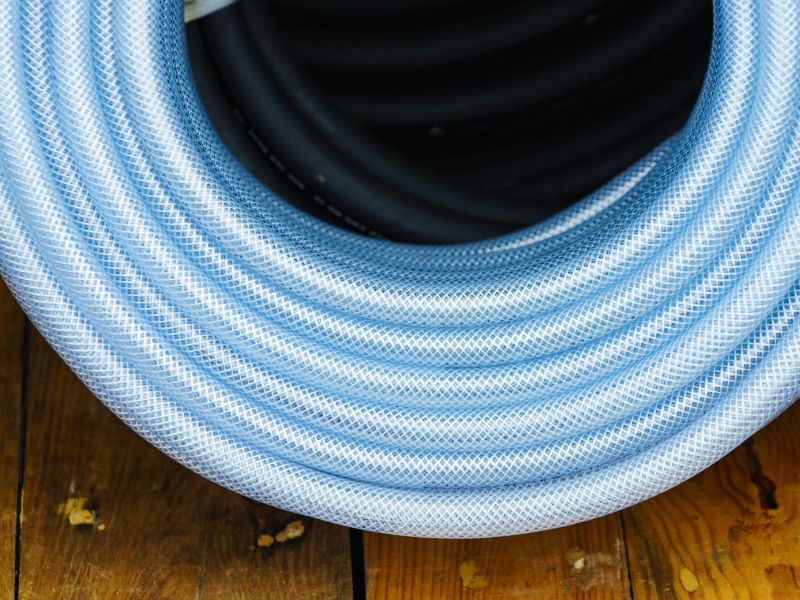What is flexible PVC? Flexible PVC is flexible tubing manufactured with the addition of plasticizers so that a level of malleability is achieved. It is made to match the same size of the PVC Pipe you are more familiar with, rigid schedule 40 PVC.
Flexible PVC: What Is It?
Flexible PVC (Polyvinyl Chloride) is a versatile, durable material widely used in plumbing, irrigation, and industrial applications. Unlike rigid PVC pipes, flexible PVC tubing is designed to bend and maneuver around obstacles, making it ideal for projects where traditional rigid piping is impractical. It’s commonly used in pool plumbing, spa systems, and landscaping applications.
If you're considering flexible PVC for your next project, this guide will walk you through its benefits, uses, and installation tips.
Benefits of Flexible PVC
1. Ease of Installation: Flexible PVC can navigate corners and obstacles without the need for additional fittings, reducing installation time and costs.
2. Durability: It resists corrosion, UV damage, and chemical wear, making it suitable for both indoor and outdoor use.
3. Versatility: Flexible PVC works well in a variety of environments, from water systems to air ventilation.
4. Shock Absorption: Its flexibility helps absorb vibrations, making it ideal for systems with moving parts, like pumps.
Common Uses for Flexible PVC
1. Pool and Spa Plumbing: Perfect for areas requiring flexibility around pumps and filters.
2. Irrigation Systems: Works well in gardens and landscaping where rigid pipes may be challenging to fit.
3. Aquariums and Fountains: Provides water flow flexibility for intricate setups.
4. HVAC Systems: Used for air ducts and ventilation.
How to Work with Flexible PVC
1. Cutting: Use a PVC cutter or a fine-toothed saw for clean cuts. Ensure the ends are smooth to avoid leaks.
2. Priming and Cementing: Use a PVC primer to prepare the surface, then apply flexible PVC cement for a strong, secure bond. Avoid standard rigid PVC cement, as it may not provide a proper seal.
3. Clamping: Secure the tubing with clamps or brackets to prevent shifting or damage over time.
4. Temperature Considerations: Avoid extreme temperatures as they can affect the flexibility and durability of the material.
Black Flexible PVC vs. Other Flexible PVC
Black flexible PVC, often referred to as "Black Flex," is a specific variant of flexible PVC tubing designed for outdoor and high-stress applications. Here’s how it compares:
1. UV Resistance
• Black Flex PVC: Offers superior UV resistance, making it ideal for outdoor applications like pool plumbing, landscaping, or irrigation systems exposed to sunlight.
• Standard Flex PVC: While durable, clear and white PVC tubing can degrade over time with prolonged UV exposure unless treated or shielded.
2. Durability
• Black Flex PVC: Its thick walls and UV-resistant additives make it exceptionally long-lasting in harsh environments. It’s better suited for above-ground installations.
• White/Clear Flex PVC: Still highly durable but more commonly used for indoor or underground installations where UV protection isn’t a concern.
3. Aesthetics and Functionality
• Black Flex PVC: The dark color blends seamlessly into outdoor settings, such as ponds or irrigation systems, offering a clean and professional look.
• Standard Flex PVC: Transparent or white PVC is better for applications where visibility or a lighter appearance is needed, such as in aquariums or industrial setups.
Applications of Black Flexible PVC
Black flexible PVC is a favorite in:
• Pool Plumbing: Its UV resistance ensures longevity for above-ground and exposed sections of plumbing.
• Irrigation Systems: With its ability to blend into natural environments, it’s popular in landscaping projects.
• Outdoor Fountains and Ponds: Ideal for projects exposed to the elements due to its resistance to cracking and fading.
Important Tips
• Always check for compatibility with your system, especially regarding pressure and temperature limits.
• Avoid sharp bends to prevent kinks or blockages in the tubing.
• Check local plumbing codes for any specific requirements regarding flexible PVC use.
Conclusion
Flexible PVC is a reliable, adaptable solution for projects that demand flexibility and durability. Whether you're working on a pool, irrigation system, or custom plumbing setup, this material offers a practical alternative to rigid piping.

